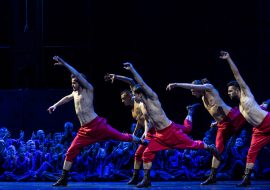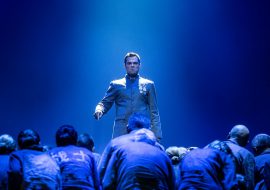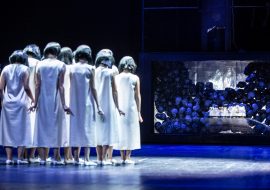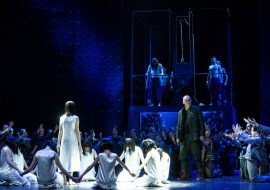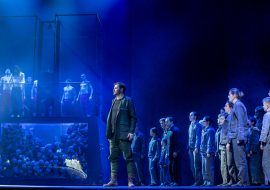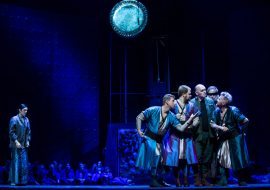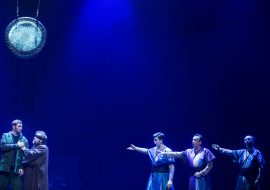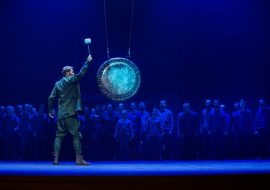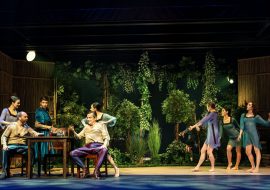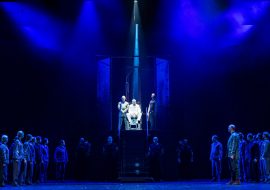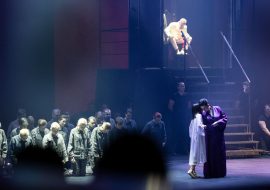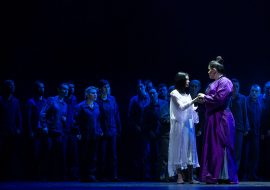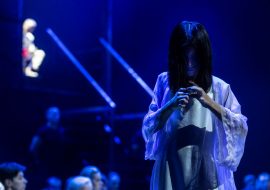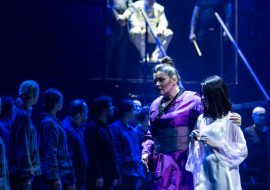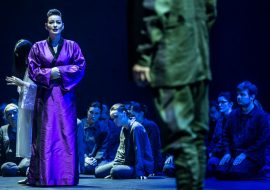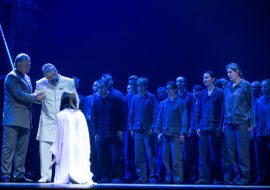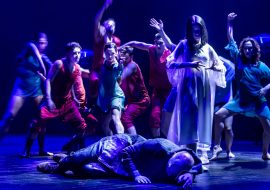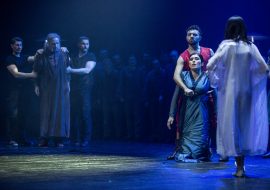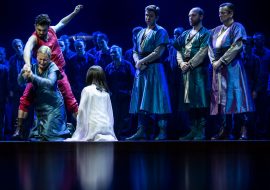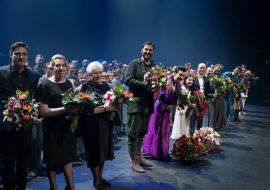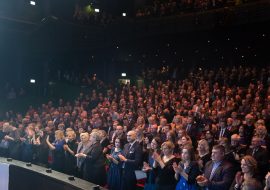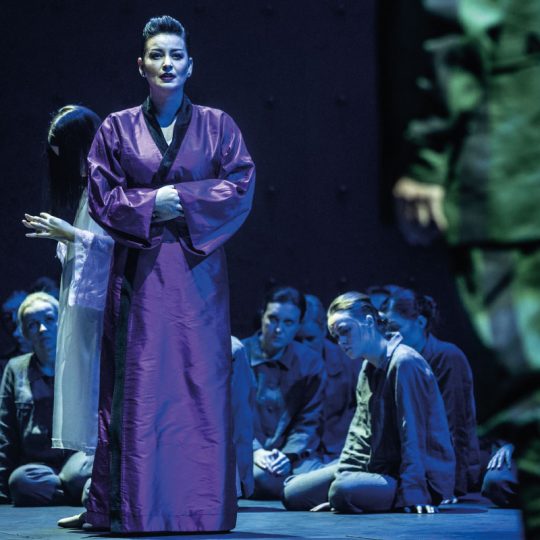After “Turandot’s” premiere
“Turandot’s” premiere, and the first three December performances, are already behind us. In Podlasie Opera and Philharmonic’s production, for the first time in Poland, Puccini’s “Turandot” was presented as it was for the very first time: without the finale added by Franco Alfano.
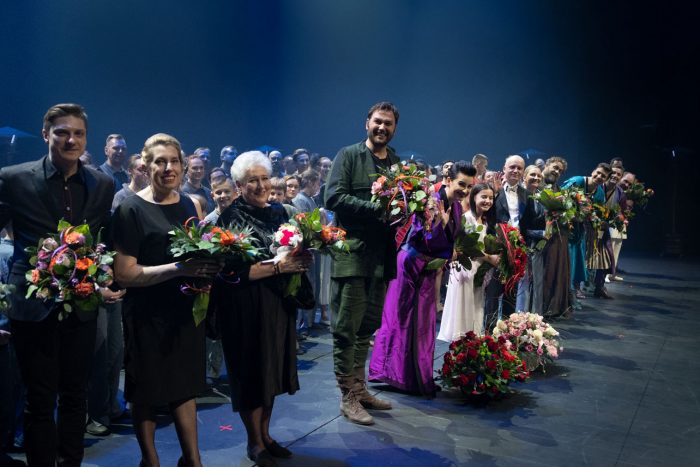
Director Marek Weiss agreed with the music director Grzegorz Berniak and Podlasie Opera’s general director Damian Tanajewski to show only what was written by the master himself. That allowed new psychological reading of Turandot’s character and dividing it into two roles: wounded little princess and mature woman. Great divas Ewa Vesin and Wioletta Chodowicz are accompanied by two young actresses: Amelia Gabrylewska and Hanna Karetko. The well-known “Nessun dorma” aria was sung in Podlasie Opera Rafał Bartmiński and Tomasz Kuk as Calaf. The great lyrical parts of Liù was performed by Katarzyna Trylnik and Marcelina Beucher. As Timur performed Remigiusz Łukomski and Grzegorz Szostak. Humouristic accent was provided by Arkadiusz Anyszka and Jaromir Trafankowski, Aleksander Kunach and Ryszard Minkiewicz, and Łukasz Załęski and Adam Zdunikowski as Ping, Pang, and Pong. As the Emperor performed Paweł Cichoński and Krzysztof Stankiewicz, and as the Mandarin Dariusz Machej and Maciej Nerkowski. The soloists was accompanied by the dancers of the White Dance Theatre of Izadora Weiss: Marta Barossi, Ieva Ievina, Lena Paetsch, Nadja Simchen, Maya Triay, Giuseppe Bencivenga, Beniamin Citkowski, Peter Džubera, Joshua Feist, and Mateusz Sobczak, prepared of course by Izadora Weiss, who has also designed the costumes. The great groups of Podlasie Opera and Philharmonic Choir and Children’s Choir was prepared by Violetta Bielecka and Ewa Barbara Rafałko. Also contributed to the success: assistant conductor Maciej Tomasiewicz, pianist-répétiteur Tetyana Dranchuk, executive producer Anna Jakubowska-Podsiad, and assistant director Rafał Supiński.
“Adaptation and direction by Marek Weiss may remind a little some works by Quentin Tarantino, director who teases viewers most of the time, to finally give them satisfaction at the end of the movie, by releasing the action towards particular direction. That’s also how the action of his late works was designed by Witold Lutosławski. In the case of Białystok’s version of Puccini’s ‘Turandot’ we’re dealing with modernity. […] Orchestra under the baton of Grzegorz Berniak played diligently, with balanced proportions and rich and diversified sound. Once delicately, sophisticatedly, impressionistically, kind of oneirically, but once brutally and beautifully at the same time, and of course precisely. Listening to Violetta Bielecka’s choir is a marvellous sensation. The choir provides us with the music that’s pure, resonant, and expressive. It’s accompanied by the Ewa Barbara Rafałko’s children’s choir, just as moving. The soloists are great as well. Turandot, Ewa Vesin, is just perfect, with her voice magnificent, adequately hysterical, thick, meaty, expressing both the power of passion and the horror that Turandot felt. […] Katarzyna Trylnik gave profound meaning to the character of Liù, singing with soprano soft, with lovely tone, full of sadness and tenderness. Tenor, Rafał Bartmiński, gave us a great Calaf, powerfully sounding, heroic, and looking good as a handsome soldier. […] Exceptionally special was Pong, Adam Zdunikowski; his tenor marks the kindness, sense of humour, and lovely, warm tone of voice. […] Uniqueness of the 3rd act and simultaneously the whole production of Podlasie Opera lies in the fact that to the material left by dying Puccini the creators did not add the finale written by the master’s student, Franco Alfano. That idea helped paying homage to Puccini, changing the end of the opera into a requiem. The crowd of choirists, singing over the body of the late Liù, for the first time seems different, humane, and gives hope that something may change in the empire of Turandot,” says for the Radio Białystok musicologist Magdalena Gajl.
“That love, in line with the opera canon of the past ages, has to be dramatic, crazy, a little fanciful. And that’s how it is, to appeal to the lovers of classic opera. We have to remember, though, that Giacomo Puccini was writing his last oeuvre whilst observing the birth of fascism. And the ensemble parts are what constitutes its unique power, also the artistic one. Despite the apparently modest set design, mostly the square in front of the palace and Peking by night, that very ascetism helps the viewers see the frenzy of the absolute rule. […] Is the annihilation and manipulating the crowd according to the old Roman rule ‘bread and circuses’ not the real subject of ‘Turandot?’ It is said that Giacomo Puccini appeared sympathetic to the emerging fascism, and Benito Mussolini, yes, the one from the roman salute, was a great supporter of the idea of making Italy great like the Roman empire again. In the Białystok’s production Marek Weiss-Grzesiński and Paweł Dobrzycki—the director and the set designer—expose the totalitarian regime so it’s plain to see. Regular people, apparently free, are surrounded by tall, robust wall. Surrounded and alienated from the palace. They can admire the precision of the guillotine from afar, and while kneeling before him they can glance at the face of the old emperor, who knows his people. If he decides to throw them another victims, the power shall not be undermined. He will not show mercy not even to his own daughter. How similar this seems to the life of Stalin, who got captive be the Germans. And the ascetism of the set design, as opposed to the worldwide productions dripping with gold, really brings to mind the times of the cultural revolution in China,” writes Jerzy Doroszkiewicz for the “Kuriera Poranny”.
See the full photo-report by Michał Heller on his photoblog OPERA_SPACE: December 7 and December 8.
Throughout the whole premiere we were accompanied by Radio Białystok. Listen to (and see) the extensive report (in Polish):
Before the premiere: interviews by Adam Klimiuk.
After the premiere: review by Magdalena Gajl and relations by Adam Klimiuk, Wojciech Kujałowicz and Olga Gordiejew.
After the premiere: interviews by Wojciech Kujałowicz and Olga Gordiejew.
After the premiere: relation by Anna Dycha on BiałystokOnline.pl.
After the premiere: relation in TVP.



